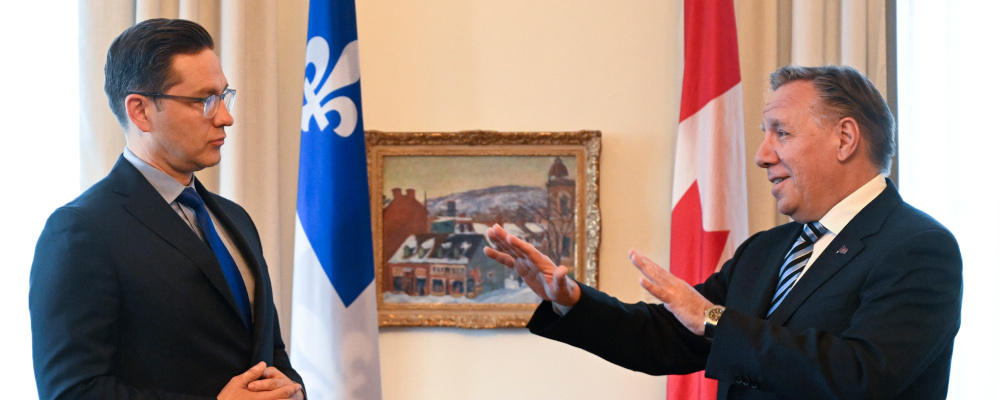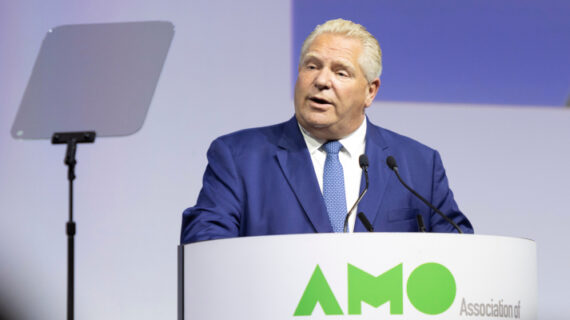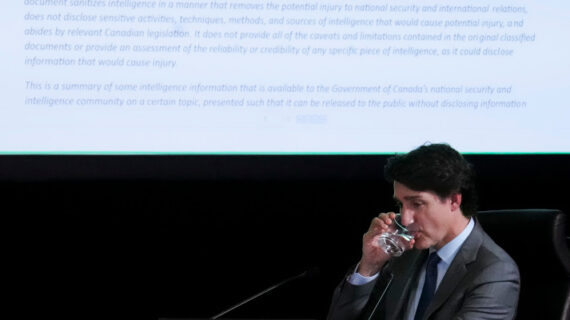Conservative partisans will doubtlessly be flying high this week after the party executed a near-flawless biennial convention in Québec City over the weekend.
The boisterous three-day affair showcased an energized party that’s the most united it’s been since the departure of its founding leader Stephen Harper. Virtually every detail, right down to the choice of host city, evinced a Conservative party that’s brimming with confidence and eager to take the fight to the governing Liberal party—even in parts of the country that have historically been the Liberals’ turf.
Party leader Pierre Poilievre naturally had his share of kind words for the convention’s host province in Friday night’s keynote address:
“This business of deleting our past must end,” Poilievre said in one of the speech’s most widely shared moments. “And this is a matter on which English Canada must learn from Québec.”
“Quebecers—I’m saying this in English deliberately—do not apologize for their culture, language, or history. They celebrate it. And all Canadians should do the same,” finished Poilievre to rapturous applause.
Yet for all his outward confidence, Poilievre is no doubt acutely aware that he’ll need more than platitudes to lead his party to a long-awaited electoral breakthrough in Québec; the one part of the country that’s thus far resisted the Conservative wave sweeping Canada. While the Poilievre-led Conservatives have shown some signs of life in the province, polls indicate the party remains stuck in third place, behind both the Liberals and the Bloc Québécois.
What’s even worse for Poilievre is that the populist sloganeering that’s been his bread-and-butter elsewhere in Canada can only hurt him in la belle province. Take, for instance, the tried-and-true applause-getter “axe the (carbon) tax.” (Polls show that Quebecers are more likely than other Canadians to describe climate change as a “major crisis”). Poilievre’s populist-tinged attacks on the CBC also play poorly in Québec, where the public stands firmly behind taxpayer-funded cultural industries. (Some pundits have speculated that Stephen Harper’s dismissive comments about the arts cost him seats in Québec and, consequently, a majority government in 2008).
There’s no easy way out of this conundrum for Poilievre as the rise of social media means that he can’t simply run separate campaigns, emphasizing separate issues, in Québec and the Rest of Canada (as NDP leader Jack Layton was able to do successfully in 2011).
The irony of the situation is that, within Québec, conservatism is as ascendant as it’s been at any time since before the Quiet Revolution. Right-leaning parties took home a combined fifty-two percent of the popular vote in last year’s provincial election as the centre-Right Coalition Avenir Québec (CAQ) won its second consecutive majority government in convincing fashion. Meanwhile, the Liberals and Parti Québécois, once the province’s two strongest parties, each limped to historically bad finishes.
How can one square the rise of Québec’s Right with the Conservative Party’s continued struggle to make inroads into the province? Unfortunately for Poilievre and co., this impasse is unlikely to be resolved with a simple change in messaging.
In a recent interview with The Hub’s Sean Speer, Montréal-based public intellectual Mathieu Bock-Côté had the following to say on the irreconcilable differences between the Anglo-Canadian and Québécois strains of conservatism:
I do not believe their marriage is compatible today. Because Anglo-Canadian conservatism, to me, seems detached from any defense of a substantial cultural identity to the extent it does not fit into the Anglo-Canadian reference.
Bock-Côté gave a middling assessment of Conservative party leader Pierre Poilievre, whom he accused of omitting “certain fundamental themes”, (e.g.: multiculturalism, immigration), “that would allow him to engage in real ideological confrontation with the Liberal Party of Canada.”
While pessimistic on their face, Bock-Côté’s comments hint at a new way forward for conservatism in Canada. Rather than fruitlessly trying to reconcile two irreconcilable visions of conservatism under the banner of a single party, conservatives in Québec and the Rest of Canada should branch out into two separate but affiliated parties: the Conservative Party and the CAQ.
While coalition parties are virtually unheard of in Canada (the misleadingly named “Canadian Alliance” notwithstanding), they’re commonplace in many of our peer countries. Notably, the Liberal-National coalition has been the dominant player on Australia’s Right since the end of World War II. (The practice of preferential voting allows the two allied parties to compete in “three-cornered contests” against the centre-Left Labor party).
Canada’s conservative movement can perhaps learn the most from the arrangement between Germany’s Christian Democratic Union (CDU) and its sister party the Christian Social Union (CSU). The CSU runs candidates in the culturally distinct state of Bavaria while the CDU is active in Germany’s other fifteen states. The two parties are organizationally independent but campaign together in federal elections, regularly signing coalition treaties beforehand. Historically, the CSU has been successful at leveraging its relationship with the CDU to exert substantial control over social and cultural matters, for instance, frustrating the efforts of centrists to liberalize the country’s abortion laws. (When in government, CSU representatives often receive portfolios overseeing family and cultural policy.)

A CDU/CSU arrangement would have an obvious appeal to conservatives in Québec, giving them a seat at the table while, at the same time, untethering them from Conservative Party positions that are likely to be unpopular in their home province. A coalition structure would also free the Québec wing from the strictures of party discipline, allowing it to place a check on the Conservative Party on matters relating to culture, the environment, and other issues of central importance to Quebecers.
This is, admittedly, not a new idea, but it’s one whose time has finally come. Now closing out its fifth year in power, the CAQ has masterfully mobilized the latent cultural conservatism of Québec’s electorate (particularly outside of the Island of Montréal). The party’s avuncular leader François Legault is arguably Canada’s single most powerful political figure today.
Yet contrary to his party’s name (pronounced “kaak”), Legault himself is no spring chicken; he’ll be close to 70 by the time his current term in office comes to an end. Legault may soon come to realize that he’s accomplished as much as he can at the provincial level and look to make his mark on Ottawa’s political landscape. Québec’s recent political history is replete with examples of politicians who’ve oscillated between provincial and federal politics, among them Lucien Bouchard and Jean Charest. Poilievre could well find, in Legault, a receptive partner to a CAQ/CPC union.
Of course, the Harper years show that Poilievre can win, and perhaps even eke out a slim majority, without making much of a dent in Québec. However, he should be thinking on a grander scale as he may well be facing a historically unpopular incumbent government when the next election rolls around. A CAQ-assisted breakthrough in Québec could be his path to a Mulroney-esque supermajority, giving him a free hand to pursue an ambitious policy agenda. Now’s the time for Poilievre to swing for the fences.
A CPC/CAQ alliance may sound like a political pipe dream, but it can be engineered with relative ease and could, in fact, permanently bridge the gap between the Québécois and Anglo-Canadian traditions of conservatism. The time is now to seize this possibly transformative idea.
Go big or go home.




